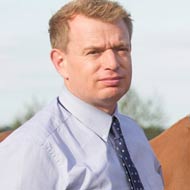
Mark Bowen looks ahead at his presidential year
The equine veterinary profession must continue to support those who 'think outside the box', said Mark Bowen as he took up his post as BEVA president.
Mr Bowen, an associate professor at the University of Nottingham, will serve as president for 2015/2016.
Speaking at BEVA Congress this week, he said: "Whilst the profession attempts to shape its future for the next 15 years, we must continue to support the innovative individuals in the profession who look 'outside the box' ."
We must make sure, he added, "that the future of our profession, the next generation of veterinary surgeons, does not become restricted by dogma and tradition; that they too can replicate the level of innovation seen in equine practice over the last 50 years."
A priority for the organisation is to strengthen its relationship with the British Horseracing Authority and to contribute to the development of a new fundraising body, to replace the Horserace Betting Levy Board.
BEVA is becoming an ever more "forceful and effective voice for the equine profession" and its strengths "lie in its members", he said.
Key areas where the association promises to make veterinary voices heard include: the regulation of allied professionals, the rescheduling of ketamine, new EU animal health regulations and EU medicines regulations.
"Lastly, employment and retention of veterinary graduates in the profession is a cause of concern to us all," he added. With a special interest in veterinary education and equine cardiology, Mr Bowen is one of the few veterinary surgeons to have achieved the status of principal fellow of the Higher Education Academy.
"Over the next year we will enhance the Internship Awareness Programme and provide support and mentoring for the younger members of the profession.
"BEVA Council is full of individuals committed to working on your behalf and I am looking forward to working alongside them all for the benefit of us all."
Mr Bowen graduated from the Royal Veterinary College in 1996 and remained there in employment for a further nine years before becoming one of the founding members of staff at Nottingham vet school.
As well as specialising in large animal internal medicine, he holds RCVS certificates in equine internal medicine and veterinary anaesthesia. He also has a masters in medical education.
He will officially take over the role from Andrew Harrison at the end of BEVA Congress tomorrow (12 September).
Image courtesy of the BEVA



 The veterinary mental health charity Vetlife is inviting the veterinary community to join it for a sponsored cold-water dip.
The veterinary mental health charity Vetlife is inviting the veterinary community to join it for a sponsored cold-water dip.